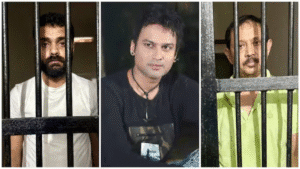The sudden arrests of Zubeen Garg’s manager and event organiser have deepened the mystery around the singer’s death in Singapore, shaking the music industry.
In a breaking news update that has gripped Assam and India’s entertainment world, police arrested singer Zubeen Garg’s manager Siddhartha Sharma and festival organiser Shyamkanu Mahanta on October 1, 2025. The two were detained in Delhi and taken to Guwahati, where they face questioning in connection with Garg’s sudden death in Singapore on September 19. Their arrest is being seen as a turning point in the investigation, raising concerns about negligence, safety standards, and accountability within the music industry.
Key Details of the Arrests
Authorities confirmed that Siddhartha Sharma was arrested from a residence in Gurugram, while Shyamkanu Mahanta was intercepted at Delhi’s Indira Gandhi International Airport after returning from Singapore. Both were immediately flown to Guwahati under police escort.
The Special Investigation Team (SIT) presented them before a local court, which granted 14-day custody. The move, according to officials, was necessary to probe gaps in their statements and examine their role in managing Garg’s overseas trip.
Family’s Stand on the Case
Garg’s wife, Garima Garg, has demanded nothing less than full transparency. Speaking after the arrests, she said:
“We want the truth to come out. Everyone who was with him should be questioned. The law must take its course.”
Her words have resonated widely, amplifying public anger and intensifying scrutiny of those closest to the singer. For fans, the arrests provide some hope that answers may finally emerge, but they also reinforce suspicions of negligence.
Investigation: What Police Are Probing
The SIT is examining several crucial angles:
- Negligence: Did organisers fail to provide medical or safety protocols during Garg’s Singapore trip?
- Timeline: What events led up to his reported drowning at a swimming pool?
- Foul Play: Was there any motive beyond negligence, possibly linked to financial or professional disputes?
Officials revealed that the Assam government has already triggered a Mutual Legal Assistance Treaty (MLAT) with Singapore. This will enable investigators to access medical records, witness statements, and forensic evidence collected abroad.
Industry Shockwaves
The case has rattled the music industry, especially in Assam, where Garg was more than just an artist — he was an icon. Singers, composers, and cultural leaders have expressed grief and demanded reforms in how events are organised.
One veteran musician commented, “If such negligence can happen with someone like Zubeen Garg, what does it mean for younger artists? This tragedy exposes a deep flaw in how we treat our talent.”
This sentiment underscores a broader concern: whether India’s fast-growing entertainment sector has adequate safety nets for artists.
Viral News and Public Reaction
The arrests instantly turned into viral news, dominating headlines and trending across social media platforms. Fans have been sharing old clips of Garg’s performances, mixing nostalgia with grief and anger. Vigils have been organised across Assam, with thousands attending Garg’s Adya Shraddha ceremony in Jorhat.
The emotional public response has put pressure on the SIT to deliver results quickly. Social media hashtags calling for “Justice for Zubeen” continue to trend, keeping the case in the national spotlight.
Legal Complexities Ahead
While Sharma and Mahanta are now in police custody, legal experts caution that proving charges will not be easy. Since the incident occurred in Singapore, much of the evidence lies outside Indian jurisdiction. Cooperation from Singaporean authorities — including access to CCTV footage, hotel records, and autopsy details — will be crucial.
The family’s earlier FIR named both Sharma and Mahanta, accusing them of negligence and culpable homicide. Whether the evidence will support these charges remains to be seen in court.
Remembering Zubeen Garg
Zubeen Garg was a cultural giant whose music crossed linguistic and regional boundaries. From Assamese hits to Bollywood songs, his voice touched millions. His sudden death at 52 has left a vacuum in Indian music that many believe cannot be filled.
For his admirers, the ongoing investigation is not just about justice — it is about ensuring that the legacy of an artist who gave his life to music is honoured with truth and accountability.
Why the Case Matters Beyond Assam
The tragedy also raises bigger questions about the responsibilities of event organisers and managers across India. Unlike film sets, where unions often enforce safety standards, concerts and international events sometimes operate with minimal oversight.
Industry insiders now argue that the government should create enforceable regulations on artist safety during foreign trips, covering travel planning, emergency protocols, and health preparedness. The music industry may need a systemic overhaul to prevent similar incidents in the future.
Breaking News With Wider Implications
As Sharma and Mahanta’s interrogation continues, the SIT is expected to seek additional evidence and possibly call more witnesses for questioning. The coming weeks could decide whether this case leads to convictions or remains shrouded in mystery.
For now, the arrests are the most significant development in the unfolding story. They have not only given fresh momentum to the investigation but also forced India to confront uncomfortable truths about how artists are treated off stage.
The death of Zubeen Garg is no longer just a personal tragedy — it has become breaking news with consequences that could reshape accountability in India’s entertainment sector.
Quirk Report delivers today’s top stories, latest news, and breaking updates on India, world affairs, business, sports, and entertainment.

















